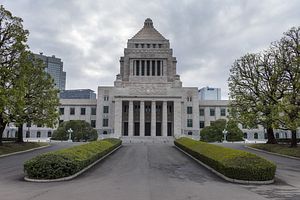The Cabinet of Prime Minister Shinzo Abe decided on Tuesday to approve the guidelines for the state secrecy law, which was passed last December. The law, which will take effect on December 10, allows the government to designate information as a state secret under four broad categories: foreign affairs, defense, counter-espionage and counter-terrorism. The law is controversial among Japanese media and civil society, although perhaps not as much as the Cabinet’s decision to reinterpret the Constitution’s stance on collective self-defense. However, it is yet another example of legislation that the ruling LDP has managed to carry through the Diet relatively uncontested, as Japan’s opposition parties remain weak, fractured, and hopelessly outnumbered.
State secrets will be designated by the heads of 19 different agencies and ministries encompassing a wide range of government functions, including the Nuclear Regulation Authority, the Defense Ministry, and the Cabinet Secretariat. Additionally, these government heads will be able to identify state secrets among 55 different categories: from the development of military hardware to information shared through almost any medium by the national and foreign governments, as well as international organizations. The penalty for divulging state secrets will be a 10-year sentence for public officials, and five years for journalists.
Aside from the broad and as yet undefined nature of what will and will not constitute a state secret, the public and the media have raised concerns with the oversight mechanism the government plans to put in place. A Cabinet position at the deputy-director-general level will be created as an “independent archive management official.” The first concern with such an official is that it would be chosen by the very government it is assigned to review. While the official “would check whether the designation of state secrets was being conducted appropriately,” and “have the authority to peruse material to be categorized as state secrets and request it be declassified if it is decided the designation was made inappropriately,” there is no mechanism in place to force ministers to either comply with requests or declassify information. Additionally, although a channel for whistleblowers is expected to be put in place to alert the new inspector to illegal government activity, “whistleblowers will be obliged not to reveal details about the state secrets they are dealing with in reporting suspicious handlings,” according to the Nikkei.
While Abe’s government has said the new law is necessary in order for other countries to feel secure in exchanging classified information with Japan, and indeed the U.S. has encouraged Japan in this legislation, the amount of room available for the government to decide what constitutes a state secret is not well-defined. That ambiguity, combined with oversight officials that lack the ability to enforce even those guidelines that are vaguely laid out, are what has prompted the greatest public concern with the new law. The lack of an effective political opposition since the LDP returned to power in late 2012 has allowed the legislation to remain largely unchanged. However, once passed, any future government can make use of the law, assuming it survives the review process slated for five years after it goes into effect.

































